Contents :
- Web Portal – PHP.ini configuration
- Configuration of Remote DSN
- Schedule Backup of MS SQL server DB
- Setup proper permission for Web folder in DR.
- Report Settings – Macro definition for MS Access
- Proper Fonts usage in Dream Report
- Path length limitation in ODBC DSN to DB
- Redundancy in DR
- DB size limit in DR
- How to configure Date time format to be used in SQL or in SQC?
- MySQL Connection Timeout
- Feb 2007 cumulative time zone update for Microsoft Windows OS’s
- PHP – CGI error in Web – W2K3 Server
- SQL compatibility
- How far Dream Report fits with secured network environments, in particular for web accesses based on https.
- When I’m storing the data into SQL server DB tables are created, but no data is stored.
- Logger Init failed message in DRT on project start up.
- Dream Report SQL Table parsing.
- Determine how many Tags have been used in a project
- What happens if a Report or Project exceeds the licensed Tag count?
- PHP manual configuration!
|
|
|
Question:
Web Portal – PHP.ini configuration
In the DR Web portal I’m getting strange messages: “Notice…”
|
|
Answer:
During DR installation we are installing PHP component, it requires distribution of php.ini into Windows directory. If on the computer PHP was already installed php.ini won’t be overwritten. So in order to resolve that problem you have to modify php.ini manually: Go to Window directory, find and open it. In side you’ll find “Error handling and logging” section. As a parameter put:
error_reporting = E_ALL & ~E_NOTICE & ~E_STRICT
Then save it and restart DR web portal.
|
|
|
Question:
Configuration of Remote DSN
How to configure the DSN for remote SQL server?
|
|
Answer:
- You have to ensure that TCP/IP connection is enabled on SQL server and remote
access to SQL server configured well. For Example port 1433 is open in firewall
and router properly set. (See your System Administrator for more details)
- See movie “DR_To_SQL_Tutorial” located in the same directory as FAQ
|
|
|
Question:
Schedule Backup of MS SQL server DB
How to schedule backups for my SQL 2005 Express DR Data Base?
|
|
Answer:
- You have to ensure that you have administrative rights to access SQL 2005 Express server
- Import the “expressmaint.sql” SQL script which is located in the same directory as FAQ to the SQL server.
- User script is the following:
exec expressmaint
@database = ‘ALL_USER’,
@optype = ‘DB’,
@backupfldr = ‘<path>\backups’,
@reportfldr = ‘<path>\BackupReport’,
@verify = 1,
@dbretainunit = ‘days’,
@dbretainval = 1,
@rptretainunit = ‘days’,
@rptretainval = 1,
@report = 1
Save this script with SQL extension
4. Create a bat file which launches user script as follows:
SQLCMD.EXE -S . -i “<path>\userfullbackup.sql”
5. Create a fake report in DR, schedule execution time of it according your needs and
in Report Settings define macro that executes bat file from p.4.
|
|
|
Question:
Setup proper permission for Web folder in DR.
How to set permission for Web folder in order to ensure proper report generation from
Dream Report Web portal?
|
|
Answer:
In case of generation problem using the web portal, you have to make sure the
web folder of the project has read/write permissions for everyone.
So, if you right click the web folder of the project, then choose properties from
context menu. The folder properties dialog will be opened; you should have a
security tab. If you don’t, it means that you are either using a FAT32 partition, or
that you are using Simple Sharing mode. To switch from simple sharing mode to
regular one, from Windows Explorer, go to the tools menu, then Folder options,
go to the second tab (View), then uncheck the last check box of the advanced
properties as shown in the screen shot below:
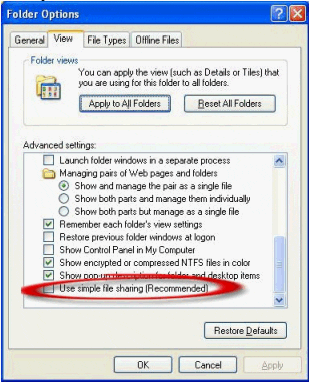
If you are using a FAT32 partition, there are no security settings, so the problem
is somewhere else and might be more complex. Please contact Support to resolve
this issue.
So once you have the security tab available, make sure you have an entry
“IUSR_<computer name>” with modify or full control setting. If you don’t, then
add a new user to the list and give it read/write access by either checking
“modify” or “full control” as shown in the screenshot below:
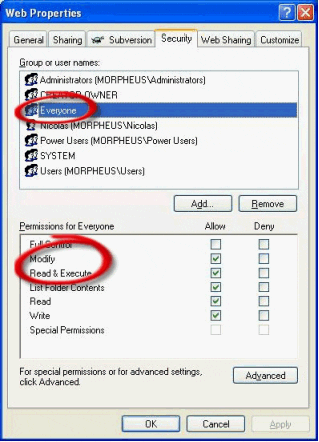
In French, instead of typing “IUSR_<computer name>”, type “Tout le monde”
and similar to “IUSR_<computer name>” in other OS languages.
Then it should be ok.
Just to summarize:
1 – Right Click the Web folder
2 – Properties -> Security
3 – Add “IUSR_<computer name>” with modify access
|
|
|
Question:
Report Settings – Macro definition for MS Access
How to define macro in DR report setting in order to be able to launch and execute MS
Access Macro?
|
|
Answer:
Create Macro in DR Report as follow: MACC:”<Path> MACC:”<Path> MACC:”<Path> MACC:”<Path>\\\\<DB_Name.mdb>”:<Macro_Name> <DB_Name.mdb>”:<Macro_Name> <DB_Name.mdb>”:<Macro_Name> <DB_Name.mdb>”:<Macro_Name>
Importance! It is on user responsibility to ensure that MS Access macro will not include some
popup messages or stuff that can block continues execution of the Macro. All this due to the fact
that DR Runtime will wait until macro will be completely executed and then will execute next
tasks.
|
|
|
Question:
Proper Fonts usage in Dream Report
Instead getting correct character set while adding text to DR Report, I’m getting strange
characters. How to fix this problem?
|
|
Answer:
By default DR is set to Arial (European) characters set. Please select instead of this one
character set without any extension.
|
|
|
Question:
Path length limitation in ODBC DSN to DB
Each time I’m trying to run DRT.exe or generate report from DRT.exe it will ask me to
specify DSN for DR DB?
|
|
Answer:
The problem can be linked to the fact that path to your Project Database folder is longer
then 128 characters. ODBC has limited path length to specify where DB is located.
Solution is following: please move your project to directory so, that patch length will be
shorter then 128 characters.
|
|
|
Question:
Redundancy in DR
How DR can work in redundancy mode.
|
|
Answer:
- Put the same project on Master and Backup machines (nodes/servers).
- Configure both projects to record data in the same database. Driver name and
item names will be the same, so it will write in the same table.
- Define a special flag (data point) on your server, which will tell to Dream Report
logger if Master machine is active or not. Define log group so it will record data
on condition when master station is active and status flag is raised to 1.
- On Backup Dream Report project you can define so, that groups will log data
only under condition that backup flag has a value, corresponding to the status
when master is not active. So, only one station at a time will record data into a
common database. Regarding redundancy in the web portal, we can see only indirect solutions, like:
to define one alias like http://localhost/DRmaster and http://localhost/DRbackup
on the same web server machine, but configured on remote master and backup
machines. So, if http://localhost/DRmaster page will be unavailable, it will be
redirected to a backup machine.
|
|
|
Question:
DB size limit in DR
When I configure database limit, if I have a database that exceed these settings (eg
2Gbyte), what’s happened with new data values? Will it be stored?
|
|
Answer:
If database limit is reached – new data should be recorded and appropriate amount of old
data will be deleted (FIFO).
|
|
|
Question:
How to configure Date time format to be used in SQL or
in SQC?
I’m using MS SQL server. I would like to use in SQC or in SQL tables as condition
calculated Time stamps for start time and end time.
|
|
Answer:
For MS SQL server you can use the following conversion function CONVERT:
Syntax for CONVERT:
CONVERT ( data_type [ ( length ) ] , expression [ , style ] )
Where:
expression – Is any valid expression.
data_type – Is the target system-supplied data type. This includes xml, bigint, and
sql_variant. Alias data types cannot be used. For more information about available data
types, see Data Types (Transact-SQL).
style – Is the style of the date format used to convert datetime or smalldatetime data to
character data (nchar, nvarchar, char, varchar, nchar, or nvarchar data types), or to
convert character data of known date or time formats to datetime or smalldatetime data;
or the string format used to convert float, real, money, or smallmoney data to character
data (nchar, nvarchar, char, varchar, nchar, or nvarchar data types). When style is NULL,
the result returned is also NULL.
The styles listed in this topic are supported by SQL Server in the described combinations
with CONVERT target data types. All other styles and combinations are not supported.
Do not use any unsupported styles. Using an unsupported style or an unsupported
combination of style and target data type might return an error or unreliable results.
These results are not guaranteed across releases of SQL Server.
SQL Server supports the date format in Arabic style by using the Kuwaiti algorithm.
In the following table, the two columns on the left represent the style values for
converting datetime or smalldatetime data to character data. Add 100 to a style value to
obtain a four-place year that includes the century (yyyy).
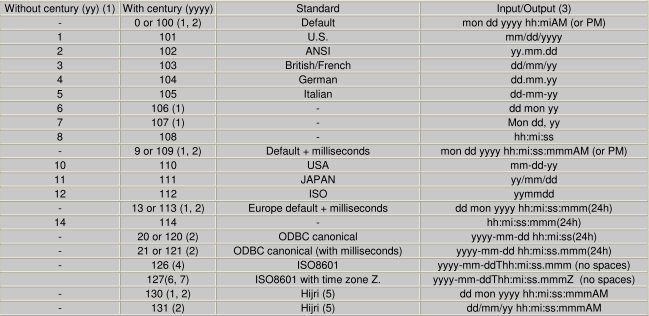
1. These style values return nondeterministic results. Includes all (yy) (without century) styles and a
subset of (yyyy) (with century) styles.
2. The default values (style 0 or 100, 9 or 109, 13 or 113, 20 or 120, and 21 or 121) always return
the century (yyyy).
3. Input when you convert to datetime; output when you convert to character data.
4. Designed for XML use. For conversion from datetime or smalldatetime to character data, the
output format is as described in the previous table.
5. Hijri is a calendar system with several variations. SQL Server 2005 uses the Kuwaiti algorithm.
By default, SQL Server interprets two-digit years based on a cutoff year of 2049. That is,
the two-digit year 49 is interpreted as 2049 and the two-digit year 50 is interpreted as
1950. Many client applications, such as those based on Automation objects, use a cutoff
year of 2030. SQL Server provides the two digit year cutoff configuration option that
changes the cutoff year used by SQL Server and allows for the consistent treatment of
dates. We recommend specifying four-digit years
6. Only supported when casting from character data to datetime or smalldatetime. When character
data that represents only date or only time components is cast to the datetime or smalldatetime data types, the unspecified time component is set to 00:00:00.000, and the unspecified date
component is set to 1900-01-01.
7. The optional time zone indicator, Z, is used to make it easier to map XML datetime values that
have time zone information to SQL Server datetime values that have no time zone. Z is the
indicator for time zone UTC-0. Other time zones are indicated with HH:MM offset in the + or –
direction. For example: 2006-12-12T23:45:12-08:00.
When you convert to character data from smalldatetime, the styles that include seconds or
milliseconds show zeros in these positions. You can truncate unwanted date parts when you
convert from datetime or smalldatetime values by using an appropriate char or varchar data
type length.
Example of SQL Query in Dream Report SQL table:
SELECT Batch_T, End_TS FROM Batch_ID WHERE (End_TS BETWEEN
CONVERT(DATETIME, [f#StartTime_Last_Batch], 105) AND
CONVERT(DATETIME, [f#EndTime_Last_Batch], 105))
|
|
|
Question:
MySQL Connection Timeout
After couple of hours Dream Report starts to generate report without values. All values
are N/A. However all data from Dream Report logger data and alarm groups continue to
be writing properly onto the MySQL DB.
|
|
Answer:
By Default MySQL connection time out is limited to 8 hours. After this time while trying
to generate report you will get error message in Dream report log file: “MySQL server
gone away”. That time out can be increased. Open “my.ini” file that usually located in
“C:\Program Files\MySQL\MySQL Server 5.0” and add additional parameter:
wait_timeout=130000 this is correspond to 48 hours connection time out. DR run time
engine is reinitializing connection with MySQL server each 24 hours.
|
|
|
Question:
Feb 2007 cumulative time zone update for Microsoft
Windows OS’s
While generation of report from Web dynamic report generation page, I’m getting values
shifted in time. My time zone is “GMT+2:00 Jerusalem”
|
|
Answer:
Starting in the spring of 2007, daylight saving time (DST) start and end dates for the
United States will transition to comply with the Energy Policy Act of 2005. DST dates in
the United States will start three weeks earlier, at 2:00 A.M. on the second Sunday in
March. DST will end one week later, at 2:00 A.M. on the first Sunday in November.
The update that this article describes changes the time zone data to account for the DST change for the United States. This update also includes other DST-related changes, time
zone-related changes, and settings-related changes. Some of these changes will occur in
2007. Some of these changes have occurred since the products that are listed in the
“Applies To” section were originally released. February 2007 cumulative time zone
update for Microsoft Windows operating systems can be found at:
http://support.microsoft.com/kb/931836
|
|
|
Question:
PHP – CGI error in Web – W2K3 Server
I’ve dream Report installed on Windows 2003 Server. In DR web portal I’m getting CGI
error while starting web portal
|
|
Answer:
Problem occurs due to security reason. Some times in addition to proper security settings
set for Web portal directory it is necessary to provide same level of authorization to php
folder. See question “Setup proper permission for Web folder in DR.”
|
|
|
Question:
SQL compatibility
When I’m trying to use SQL query in Dream Report Single Data object it appears NA in
final PDF file, however if I’m checking DB there is value correspond to this query.
|
|
Answer:
It could be that database configured so it will compatible with SQL server version which
is lower then 8.0. In this case all you need to do is to go to DB properties and change
compatibility of DB to 8.0 or higher.
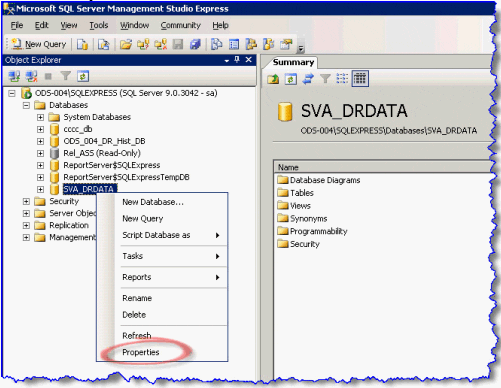
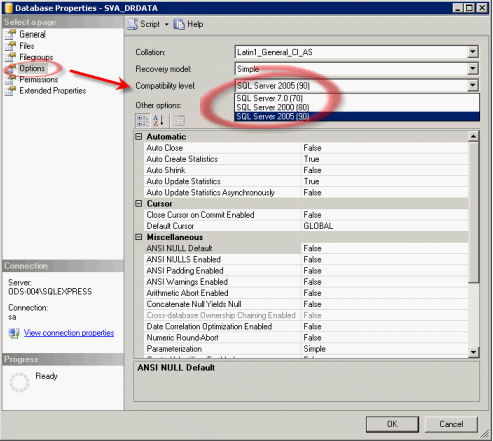
|
|
|
Question:
How far Dream Report fits with secured network
environments, in particular for web accesses based on https.
How far Dream Report fits with secured network environments, in particular for web
accesses based on https.
How can I secure the http accesses with Dream Report?
Does Dream Report support https?
Does Dream Report support SSL certificates?
|
|
Answer:
By default, the web portal is accessible using the following URL:
http://DreamReportHostName/DRWeb where DreamReportHostName is the name or IP
address of the server running the Dream Report runtime.
This URL denotes the use of http, so a communication channel without special security
concerns about the identification/authentication of the server, and no data encryption
(except if the channel is opened over a VPN or another special mechanism).
The following procedure describes steps to secure the communication channel between
the web portal server and the client by setting up:
– An SSL certificate on the server (to allow clients to authenticate the server
they connect to).
– Data encryption on the channel.
Setting up IIS for the use of SSL
Step 1
Install the SSL certificate on your IIS server (contact your system administrator for more
information). Such a certificate must be issued by a trusted third party, and therefore can
not be supplied directly by Arc Informatique / Ocean Data System.
Step 2
Launch the IIS Administration console.
Deploy the tree view and right click on the node Default Web site.

Open the Default Web Site properties, and go to the Directory security tab.
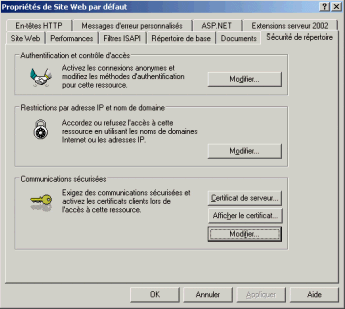
Click on the Display button to check the SSL certificate.

Note:
On this example, the SSL certificate has been self issued for a host named Arc5. It
is valid from 21/11/2007 to 28/11/2007. This certificate will not be trusted by any
usual web browsers such as Internet Explorer, FireFox or Opera because it has
not been issued by a trusted third party.
Step 3:
Close the SSL certificate display dialog box and click the Modify button to change SSL
settings.

In this example, we have activated:
– The use of SSL for server authentication
– Data encryption on the channel
Depending on your security constraints you may also activate client certificates usage
(contact your system administrator for more information).
Note:
Depending on the list and settings of existing virtual directories, you may be
required to validate the changes for some existing objects (inheritance mechanism
of IIS).
Validate and close the IIS Administration console.
All settings in this tutorial are done based on IIS 6.0, that runs on Windows 2003 Server
and on Vista, however similar settings can be applied for IIS 5.x for Windows 2000 Pro
and Server as well as for Windows XP Professional.
IIS Versions that are newer then IIS 6.0 weren’t validated at moment of release of this
document.
Step 4:
Launch Dream Studio and open your project.
Go to the menu Project settings. Web Configuration Select the remote station.
Change http to https. If necessary, change Alias name, Station name and URL.
Click on Modify and then the OK button to validate changes.
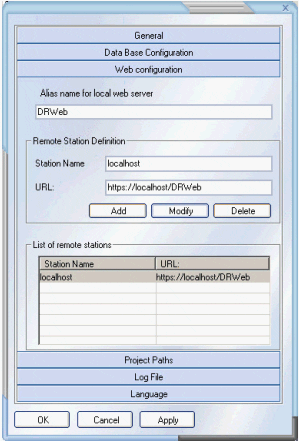
Save the project and launch the Dream Report Runtime.
Step 5:
At startup, Dream Report Runtime creates or recreates the virtual directory using the
Default Web Site configuration
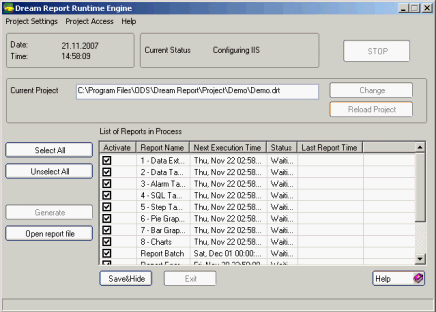
The Web Portal is now accessible using the https URL and data are encrypted on the
https channel.
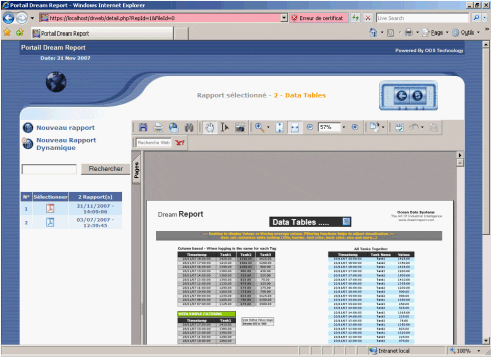
Note 1:
On the screenshot, a certificate error is mentioned because the certificate is self
issued, not trusted by Internet Explorer. This would not happen with an SSL
certificate issued by a trusted third party. In that case also, Internet Explorer
displays a warning page explaining that the server should not be trusted because
of the non-trustfull certificate issuer, and the fact that the certificate has been
issued for a server named Arc5, and the URL mention a hostname named
localhost. Validating this error forces Internet Explorer to exchange data with
such a server anyway, and therefore display the Web Portal pages.
Note 2:
Be careful to the fact that any virtual directory created using Default Web Site
properties will use the same SSL settings. It is usually the case when securing a
web server (There are no reason for securing a given virtual directory and not the
others).
|
|
|
Question:
When I’m storing the data into SQL server DB tables are
created, but no data is stored.
I’m using localized MS SQL server on OS different from English. When I’m trying to
store the data in SQL server my data is not recorded, however I see that Tables are
created in DB.
|
|
Answer:
There could be 2 reasons for this kind of behavior:
1. It name could include some specific symbols that are not supported by naming convention of SQL server. Usually we take care about this case by replacing the
specific symbols by “_” while writing into DB, however it can be that some
symbols are not in our “black list”. In that case please verify that your issue isn’t
corresponding to p.2 below and then contact us to report your problem.
2. DSN is configured to default language of OS. If it is the case please during
definition of DSN change it to English. See screen shot below:

|
|
|
Question:
Logger Init failed message in DRT on project start up.
After start up of Dream Report project in DRT I’m getting message: “Logger Init Failed”.
What should I do in order to avoid this message to be occurred?
|
|
Answer:
If you received “Logger Init Failed” message it means that DRT is not able to connect to
the DB server (Ms SQL or MySQL etc.). Please ensure:
1. That you provide proper connection string in Dream Report Project settings DB
definition part
2. That your DB server is up and running
3. Check proper definition of DSN.
|
|
|
Question:
Dream Report SQL Table parsing.
After I do “copy/paste” for SQL query that I designed in SQL Management studio into
Dream Report SQL Table my columns are not recognized properly?
|
|
Answer:
Dream Report SQL table parser doesn’t supports “carriage return” and “tab” between
entries. So for example following query:
SELECT [TS]
,[Value]
,[Description]
,[Domain]
,[Chrono]
FROM [TRENDTABLE1]
WHERE [Chrono]>= [dbo].[fn_GetFiletimeFromDatetime]
(CONVERT(Datetime,’2008-03-06 11:12:13′,121))
Has to be inserted as:
SELECT [TS] ,[Value] ,[Description] ,[Domain] ,[Chrono] FROM
[TRENDTABLE1] WHERE [Chrono]>= [dbo].[fn_GetFiletimeFromDatetime]
(CONVERT(Datetime,’2008-03-06 11:12:13′,121))
|
|
|
Question:
Determine how many Tags have been used in a project
How can I determine how many Tags have been used in a Project or on a Report? I don’t
think the number of objects indicated on a Report in the lower left corner of Dream
Report Designer Studio directly corresponds to the number of Tags used?
|
|
Answer:
The only indication is a number, displayed in a status bar in bottom left part of the studio.
There is one known issue here – when you add tags, remove, add again – sometimes it’s
not refreshed. Then, when you close studio and open it again – the used tags number will
be correct.
|
|
|
Question:
What happens if a Report or Project exceeds the
licensed Tag count?
What happens if a Report or Project exceeds the licensed Tag count?
|
|
Answer:
Tags are counted in a license not by report, but per project. If tag number is exceeded –
you can still edit your project in a studio, but not add new items and as soon as you
launch runtime – it will be closed right after launching.
|
|
|
Question:
PHP manual configuration!
I installed Dream Report on a new OS. I am trying to run the web portal but I receive the
page with some html code. What should I do?
|
|
Answer:
This situation may happen when OS or IIS is blocking script execution from while Dream
Report Installer tries to configure php settings. In order to fix this issue user can
configure manually settings of IIS:
Please make sure that .php extension is defined and configured properly:
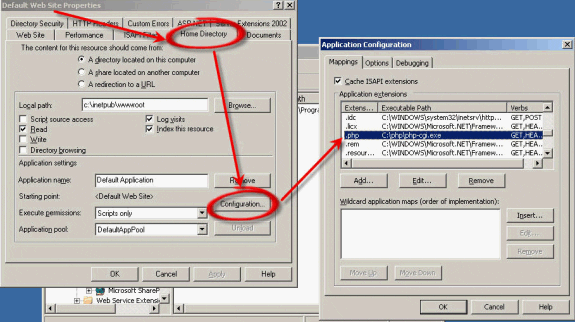
If it is not the case so please declare it by adding a new extension from “Application
Configuration” dialog above:
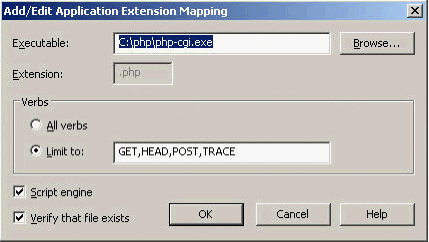
This part is applied for Windows 2003 Server. Verify that this Web service extension is
allowed:

|
|
|
|















